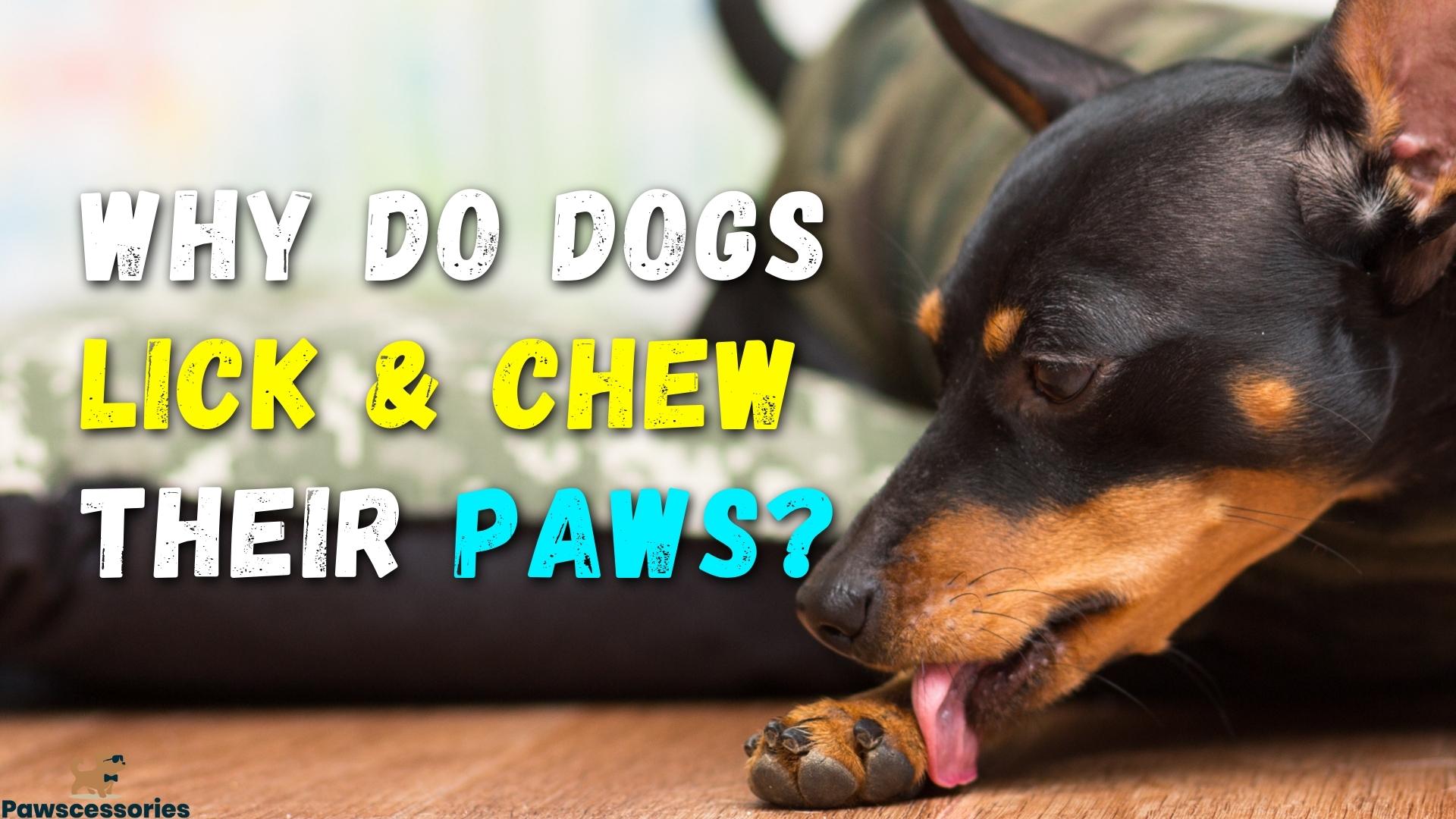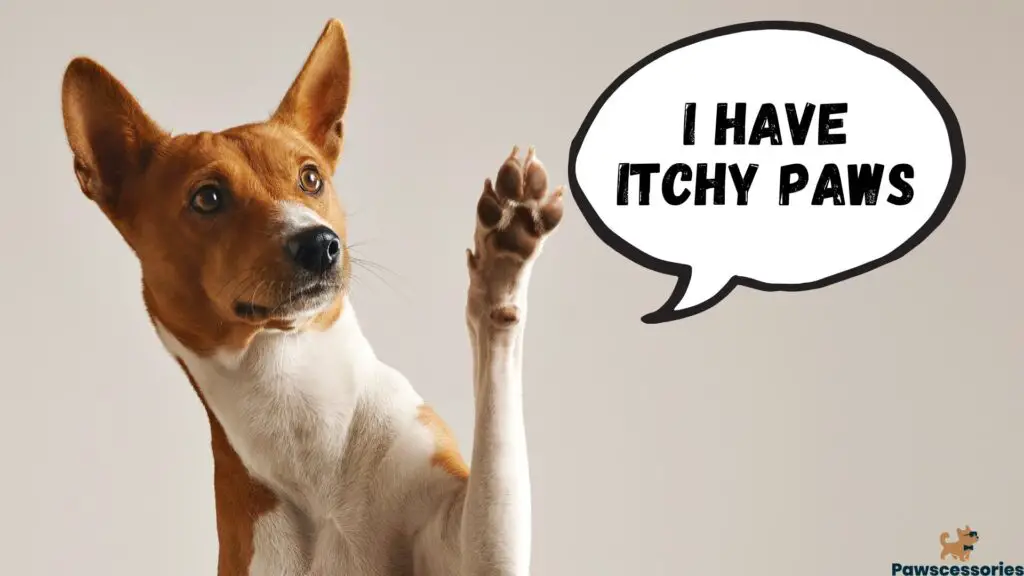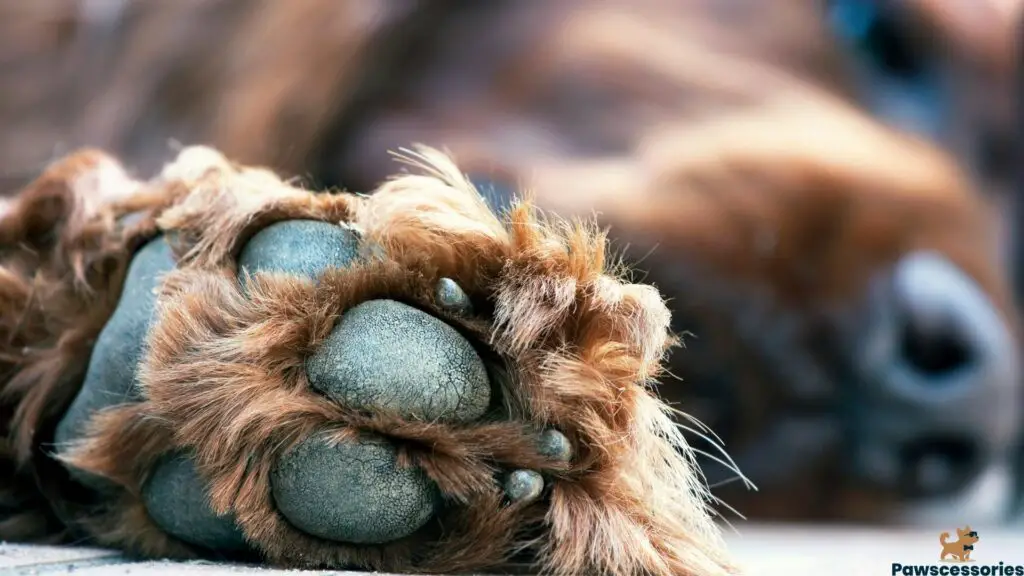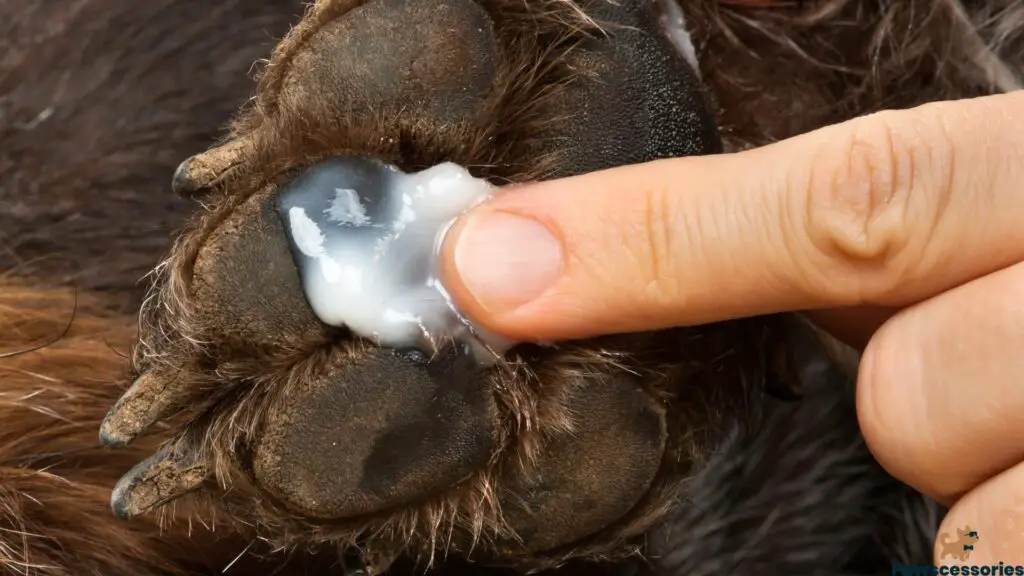Pawscessories is reader-supported. When you buy via links on our site, we may earn an affiliate commission at no cost to you.
Learn more.
There are several reasons that a dog may lick their paws. They might have a tendency to lick their paws after eating, before bed, or even at random moments throughout the day.
But why your dog is licking their paws can be for a few different reasons, some of which may be a cause for concern and could indicate injury or discomfort.
This article will show you:
- 12 reasons why dogs lick and chew their paws (#1 is most common)
- How to stop them from licking their paws
- A few strategies to protect your dogs paws
And much more…
Table of Contents

Why Do Dogs Lick and Chew Their Paws?
There are many different reasons why dogs lick and chew their paws so there is no definitive answer to this. It all depends on your dog’s behavior, health, paw/skin conditions, allergies, weather conditions and even more specific factors.
Let’s dive into each of the individual reasons for paw licking and chewing.
Top 12 Reasons Why Dogs Lick And Chew Their Paws
1.) Normal Self Grooming
Occasional paw licking is completely normal for a dog. Especially if they had just been outside after walking on dirt, grass, or sandy ground.
This is the most common reason and is a part of their daily self-grooming process. However, if you are noticing them licking their paws for long durations, frequently, and intensely, there might be something else going on.
2.) Injury / Pain
If your dog has stepped on something sharp, walked on hot or salted surfaces, and accidentally injured their paw, they may react with paw licking. There are a number of things that can cause irritation to your dog’s paws.
Here is a list of a few things that could cause discomfort or injury to your dogs paws:
– Bee stings / bug bites
– Hot sidewalk or asphalt
– Snow or ice
– Stone, thorn or something else stuck in their paw
– Walking on salted surfaces
– Torn nail
– Cut in their paw
– Growth
Look closely at your dog’s paws, nails, between toes and pads, and at the tops of the feet. Most of these issues can be resolved at home with a simple dog first aid kit but in the event your dogs paws are seriously injured visit your vet.
3.) Parasites
Another reason your dog’s paws could bug them is from parasites like fleas, ticks, or mites. The parasites can cause discomfort and itchiness on your dogs paws.
This can cause constant itching by chewing or licking their paws.
There are a few parasites each with different methods for removing them. Here are some tips about each of the most popular parasites your dog may have and what to do.
Ticks live in brushy, wooded areas and can burrow between a dog’s toes and foot pads. You’ll want a tick removal kit to properly remove the ticks embedded mouth parts without leaving anything behind.
Mites can live on animal skin, causing hair loss, scabbing, itchiness, and inflammation. This can all cause your dog to lick and chew their paws aggressively to obtain some relief of their discomfort.
The treatment of most mites requires topical or oral medication that will require a prescription from your vet.
Fleas are small parasites that feed off of the blood of their host and cause irritation and itchiness. Removing fleas can be quite annoying and difficult since you need to know their life cycle.
Fleas can lay up to 50 eggs per day for up to 100 days, meaning, by the time you figure out your dog has fleas, your home and yard is likely infested.
Consult your vet for the best flea removal plan for your dog and home. In the meantime, here is a great article covering the steps to remove fleas from your home.
4.) Food Allergies
This one on the list actually surprised me. Food allergies causing itchy paws?
It seemed strange but it’s actually quite common for certain types of allergies to cause this.
It can be quite hard to identify exactly what allergy and part of your dog’s diet is causing the itchiness.
Your vet will be able to help best in these circumstances and give you a road map for alleviating the problem.
5.) Dermatitis

Up next as a possible reason is a skin condition called dermatitis. If your dog’s paw pads appear normal, your dog may have a bacterial problem caused from food sensitivity, or allergies.
Another cause could be from chemicals used in yards on grass or weeds. If you know there may be some chemical use in your yard or in other yards your dog may wander into, wash off their paws when they come inside.
Dermatitis can be easily fixed with some supplements, cream, and shampoos.
It’s always best to get advice from your vet first, as they will know the fastest fix for your dog’s unique situation.
6.) Secondary Infections
It’s important to recognize that your dog licking is either grooming, or relieving some form of irritation. However, this can become problematic if it becomes excessive.
This is because moisture can build up from the constant licking which can cause secondary bacterial infections which just adds to the problem. It can cause more swelling, redness, itchiness, and discomfort, ultimately leading to more licking. It’s a vicious negative feedback loop.
Make sure to take your dog to the vet or look into some methods to stop your dog from continuously licking the same spots (refer to our section below on stop your dog from licking their paws).
7.) Dry Skin / Dandruff

As humans you can understand what it’s like to have dry skin or dandruff. It can be quite itchy and irritating.
The same goes for dogs which can lead them to lick and chew their paws.
One of the best options for dogs experiencing this is to get moisturizing cream rinses specific for dogs. You can also look for ones supplemented with omega-3 oil to help remove the itch from their dry skin.
Here are a couple high end products that can help with this problem:
8.) Yeast
Typically yeast infections occur when owners don’t realize there is an issue.
This allows the yeast to overgrow, contributing to itchiness, odor, and an overall greasy feel to your pups skin and coat.
To treat yeast infection you’ll want medicated shampoo, and dog wipes that contain antifungal ingredients to help control and eliminate yeast on their skin.
Here is a couple of top reviewed shampoo and wipes that can help:
- Vetoquinol Universal Medicated Shampoo
- MiconaHex+Triz Shampoo for Dogs
- Veterinary Formula Clinical Care Antiseptic and Antifungal Spray/Shampoo
- Arava Natural Medicated Dog Shampoo
- Smiling Paws Pets Wipes
- TrizCHLOR 4 Wipes
9.) Boredom / Anxiety
If you have ruled out most other stuff on this list, then your dog might be suffering from boredom or anxiety. This is the most difficult to claim as the reason your dog is licking and chewing their paws.
Over time some dogs develop these behavioral patterns that develop into compulsive disorders, like paw licking.
If you think your dog is just bored, try alleviating the boredom by increasing the frequency in which you play with your dog, take them for walks, runs, etc. You can even try giving them some puzzle toys to stimulate them mentally.
In contrast, if you think your dog has some form of anxiety, there may be a trigger like loud noises, or separation from someone causing them to lick their paws.
The Central California SPCA released a detailed article discussing 7 ways to calm anxious dogs. The 7 ways being exercise, physical contact, massage, music therapy, using time-outs, calming shirts/coats, and alternative therapies like supplements.
10.) Ringworm
Ringworm is a fungal infection that is easily spread through contact with infected soil or animals. It affects areas of the skin, hair and nails, and is commonly found on dog paws, ears, and limbs.
When a dog gets ringworm there is a round, red, raised ‘ring’ marking the boundary of the affected area.
However, infected areas may not always look ring-shaped, and can appear as round patches of hair loss. As the fungi spreads it can become irregularly shaped and spread over the dog’s body.
Furthermore, to make things more complicated some carriers can be “asymptomatic” meaning they show no signs of ringworm but spread to other animals and people.
In order to stop your dog from licking their paws you will need to treat ringworm through a combination of topical therapy and oral treatment.
It’s recommended to consult your vet to get the proper oral and topical medication to eliminate the infection.
11.) Cysts
A cysts is a fluid filled swelling that can have foreign materials embedded, especially between toes. This can cause excessive licking from your dog and might need to be removed by a vet.
Some cysts can fill with thick material and grow bigger and bigger over time.
If you are noticing some leakage it might be a sign that it needs to be removed. Consult your vet if you notice a possible cysts growth on your pup.
12.) Blisters
Most of us have had a blister before from wearing shoes with socks or for some other reason. Blisters develop in areas of friction, like in between your dogs toes!
They can be quite annoying and painful. This could also cause excessive licking or chewing on their paws.
In extreme examples of blisters, oral antibiotics may be prescribed by your vet.
How To Stop Your Dog From Licking Their Paws
When you first notice your dog’s paw licking is getting a bit excessive there are some steps you will want to take to determine the cause.
Begin by looking at their paws. Inspect the top, bottom, in between pads, around nails, and in all the nooks and crannies.
Check to see if there is anything stuck in their paws or if they have cuts, bruises, bleeding, swelling, redness, crusting, scabs, discharge, broken nails, etc.
*Note: Excessive licking can often cause saliva stains on the hairs and around the paws.
Once you have a general Idea of what is or is not causing the licking you can look to resolve the issue to help stop them from licking their paws.
If there is an injury, swelling, cut, or anything that may require topical treatment and putting stuff on their paws, do so then you’ll wrap and bandage their paws.
That way you can stop them from licking the injury, making things worse or ingesting some toxic chemicals.
If the problem is something involving a parasite make sure to remove it, if possible, and that should help stop them from licking their paw moving forward. It is still recommended to see your vet after dealing with parasites.
Lastly, if you find it might be health related (anxiety, hormones, dermatitis, ringworm, cyst, etc…) it’s essential to seek advice from your vet.
If you cannot determine a problem, you should still consult your vet so they can rule out other health problems that might not be visible by looking at their paws.
If you have determined their paw licking might not be one of the 12 reasons on this list and its just something they enjoy and have developed a habit for, here are 5 tips to help you stop them from licking their paws:
- Consider a bitter tasting topical product that is pet safe. This could deter your dog from licking their paws.
- Dog trainers and animal behaviorists are some options of people you can work with to help reduce this habit.
- Have your dog wear an Elizabethan collar or cone.
- Distract them with chew toys or puzzle toys to keep their minds busy.
- If nothing seems to work, a physical restraint like an e-collar may be necessary.
Keep in mind, changing a dog’s behaviour to stop paw licking and chewing will take time, consistency, and patience.
How To Protect Your Dogs Paws
Check Your Dogs Paws Daily
It is no secret that if you check your dog’s paws daily you are likely to catch any issue before it becomes severe. A daily habit of feeling your dog’s paws allows you to stay ahead and catch things early on.
You’ll want to examine the top and bottom of the paws, along with the nails, toe pads, and in between each paw.
Use Paw Moisturizer

There are many benefits to moisturizer, the primary being it helps keep paws from drying up, scabbing, and causing itchiness. Use moisturizer to keep their paws healthy, hydrated, and protected.
Clean Your Dog’s Paws
Keeping your dogs paws clean will help avoid any buildup of any dirt or bacteria that can cause your dogs paws to become itchy. Keeping them clean as often as you can will help protect their paws.
Trim Their Nails
Your dog’s nails can actually be one of the reasons your dog is licking their paws in the first place. That is why it’s important to trim their nails and keep them at a healthy length.
Not only does it benefit you and your hardwood floors, but it prevents your pup from breaking or splitting nails. This can be extremely uncomfortable and lead to excessive licking.
Use Protective Gear
This is going to be a tip that some of you will not be permitted to use. That is because your dog will refuse it! Most dogs don’t love the idea of wearing boots, but it can be a great way to keep your dog’s paws protected. Especially for those dealing with harsh winter conditions.
Other posts you may find interesting:
16 Ways To Know If Your Dog Is Sick + Helpful Tips
Top 5 Reasons Why Dogs Like Your Clothes
7 Reasons Why Dogs Won’t Eat + Tips To Get Them Eating
Citations:
Why Does My Dog Lick Their Paws?
Ringworm in Dogs
Why Do Dogs Lick and Chew Their Paws?
Atopic Dermatitis in Dogs: Causes, Symptoms, and Treatments
Cysts – VCA Animal Hospital
Skin Blisters (Vesiculopustular Dermatoses) in Dogs
